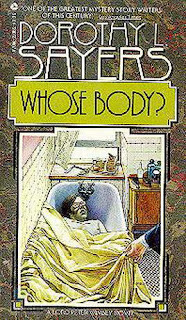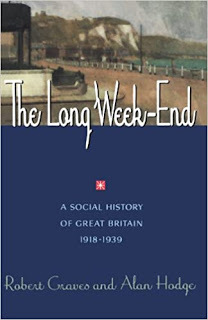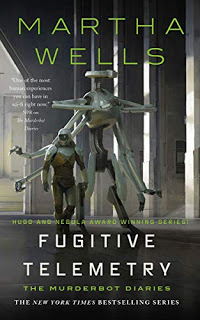Jeff Grubb's Blog, page 22
August 29, 2021
Weekending in Seattle
 View from the Balcony
View from the BalconyI tend to celebrate my birthday by not being around. Often the Lovely Bride and I decamp for some hotel, like the Salish Lodge or Alderbrook, where we get massages and I can sit in a comfortable chair and read. I've spent previous birthdays kayaking on the Bellevue Slough and riding in a zeppelin over Everett. This year, the usual haunts were already sewn up before we could make reservations, and I did not want to travel far.
And so we chose the Edgewater in downtown Seattle. The Edgewater is a luxury shoreline hotel built over the water before they stopped letting people do that, and the Beatles once stayed there once, which they don't let anyone forget. The interior has been redone a couple times, the most recent in 1990 or so, and has a PNW/Frank Lloyd Wright/Rock and Roll vibe to it. The rooms were large, comfortable, and most importantly for our case, had balconies overlooking the Sound which were perfect for reading books, drinking wine, and watching the sun go down.
The first night out we walked to Ohana, a favorite sushi spot in Belltown (an area north of downtown Seattle, which they are trying to rebrand as "Uptown"). Walking was the exercise of the weekend, even though it meant challenging a particularly steep hill on Wall Street. The food was great, the drinks were strong, and we ended up getting back to the hotel in time to watch the sun drop down in a cloudy sky. Sudden neighbor
Sudden neighborThen, in the early hours of next morning, the cruise ship arrived. The Edgewater is right next to the Port of Seattle pier, where the cruise ships dock, and in the morning our window had a nice view of the Celebrity Millenium, registered in Valletta, Malta, which had snuck in around 5 AM. Despite its sudden arrival, we breakfasted and headed for the aquarium, a short walk south.
The Seattle Aquarium is very nice, but always had a vibe of "work in progress" to me, set up within a renovated warehouse on the docks. It keeps that vibe, since it is currently working on a "ocean pavilion" across the street in the shadow of the Pike Place Market's parking structure. High points were moon jellies, a particularly cranky-looking octopus, harbor seals, and sea otters (the latter in the midst of second breakfast, dining on crabs). Everyone was masked, but there was an onslaught of children, which made me feel a little uncomfortable.
For lunch walked over to Place Pigalle, in the aforementioned Pike Place market. Place Pigelle is a small restaurant down a hallway right next to where they throw the fish. Light meal of mussels and soup (French onion in my case). Good view of the Sound, and we were serenaded by an accordion and violinist in the courtyard below. I went down to tip them and found that the musicians were wearing full cat-headed masks.So, yeah, Seattle.
 View of the city, without cruise ship
View of the city, without cruise shipAfternoon was the SAM - Seattle Art Museum, which was hosting an Monet exhibit of his work at Etretat. Etretat is a fishing village on the English Channel that in Monet's time was becoming a tourist destination. Monet (pre-Lillies) was seeking to rekindle his vision, and went to the village to paint the landmark cliffs in ways different than all the other artists of the times were painting them.
As an exhibit I really liked this a lot, primarily because it got really down into the details with the process of painting of the "open art" school. This involved such things as where Monet got his canvases, and the importance of the recent invention of tubes of pigment from America that gave the Impressionists the ability to take their work on the road. The works themselves were small for the space they provided - usually such shows are jam-packed, but this one had a lot of bare walls and creative use of empty space. That's OK, because it gave them the chance to really get into the bits and pieces of the creation of art, how it fit into Monet's life at that moment, what other artists were doing, and his technique and technology. I enjoyed it tremendously.
 The Lovely Bride
The Lovely BrideThe SAM was also masked and generally less crowded. Many of the galleries were closed and empty at this stage, and the Monet was the major draw. Still, after surveying the area, the Lovely B and made the long trudge back to the hotel, and sat on the back porch as the huge cruise ship undocked and was gone before 5 PM. We had a very pricey, very good dinner at the hotel's restaraunt, repaired to our dockside porch to the finish the wine and watched the sun go down.
And the next morning there was a NEW cruise ship parked outside our window, but we breakfasted, stopped for the groceries at Pike Place (also seriously masked up, but crowded) for smoked salmon, crab, and bread.
And so we return. It was a good weekend, and I got a bit of reading done. And that's how I spent my 64th birthday.
More later,
August 22, 2021
Book: Body of Evidence
 Whose Body? by Dorothy Sayers, Avon Books, 1923
Whose Body? by Dorothy Sayers, Avon Books, 1923Provenance: The volume has an embossed stamp "Library of Janice Kae Coulter" on the first two pages. Ms. Coulter is the spouse of fellow blogger Sacnoth. I do not know whether I plucked this volume from their collection before it went to the Page Turner, or purchased it there for two bucks and change (I suspect the latter).
Review: This was one of the Books on a Plane, but I found I had too much to say about it to just stack it up against all the Rex Stouts, so it gets its own blog post. This post deals with meta fiction, introducing characters, why Raymond Chandler may have really hated Sayers' work, and anti-Semitism. Buckle up.
Here's the precis: London after the Great War. A wealthy Jewish financier goes missing. A dead body is found naked in a bathtub.The body is not the financier's, but there is a surface similarity between the two.The police assume initially assume the bathtub body IS the financier. Lord Peter, brought in by his mother because she knows the person whose tub the body was found in, knows better.
This is the first appearance of Lord Peter Death Bredon Wimsey, and he springs onto the stage (mostly) fully formed. He had solved a previous (unrecorded) case of missing emeralds, and so already had contacts with the police as a helpful meddler whose societal privilege gives him access denied to the hoi palloi. He also has a "kit" that Batman would approve of - his cane is a measuring stick and has a concealed blade and his monocle is really a magnifying lens/ He has a dutiful manservant who is a camera buff. Lord Peter saunters in fully prepared to get involved.
While he does so, Lord Peter also talks about detective stories in a very meta way. "Were this a detective story..." the line starts, and then mentions and discards some trope from the fictions. Sayers denies some of them and plays with others - for example, witnesses never remember what really happened on a date two months ago, and the proceeds, with almost casual conversation, to show Lord Peer wheedling the information he needs out of a witness without the witness realizing it. Yet Sayers herself embraces a lot of other detective tropes - the incompetent police inspector, the blind alleys, and the dutiful details of inquest and exhumation.
But when Lord Peter solves the case, something happens. He finds the solution, but in the process suffers a nervous breakdown because the solution challenges a lot of his privilege. His recognition shakes him to the core and unleashes his PTSD from the Great War. In game terms, he blows his San check and has to go have a lie-down for a couple days. This is VERY not in keeping with traditional mysteries, in that the protagonist can get angry, vengeance, shot up, physically damaged, but never suffers a mental collapse (Stout has Wolfe occasionally go into a "Fugue state" when stymied, which feels like little more than writer's block). This is so different from the muscular American detective stories, that I can see why Chandler didn't like Sayer's work much, though he chalks it up to being "boring".. We know beans about the personal history of his Continental Op - Lord Peter has wounds deeper than most of the other characters cans see.
In doing the research for this review, I came across accusations of the author's antisemitism, and this book is used as evidence both for and against. On the "for" side we have the victim being Jewish, and one of the positive figures, Peter's mothers, going into a "Very good people" sort of speech which hauls out a lot of differences between the Jewish community and God's Own Anglicans. On the other hand, the missing financier is practically lionized for his kindness and modest living (no Shylock, he), and one of Peter's archtypical upper class friends, practically fresh from the Drones club, talks about wanting to marry the victim's daughter and convert to the faith. And there a servant who is spretty deplorable in his statements, but he is held up as being a low character who is drinking Lord Peter's best brandy. The challenge is, does, in talking about an "othered" portion of the population, does that make you vulnerable to engaging in the same forms of prejudice? Is reporting prejudice the same as perpetuating it?
The meta research here on Sayers does me no good as well. Sayers' long-time companion was Jewish, she notes that the financier was one of the few good characters in the book, and in an early draft Lord Peter recognizes immediately that the body in the tub cannot be the financier because it was circumcised (which would be kinda obvious and make the police look EVEN dumber). On the other hand, Sayers developed into a Christian apologist of CS Lewis stripe, and the work she is proud of is a translation of Dante (which features heavily in the opening chapter of this volume).
Ultimately, I am going to render a Scottish verdict of "Not Proven" on this one, but there may be some reference of her endorsing the Elders of Zion out there without me realizing. it. I do remain committed to the idea that Sayers does not write detective novels so much as novels which feature a detective. And I will stand behind that one.
More later,
August 16, 2021
Books on a Plane
 Three Witnesses by Rex Stout, Bantam, 1955
Three Witnesses by Rex Stout, Bantam, 1955Not Quite Dead Enough by Rex Stout, Bantam, 1944
Plot It Yourself by Rex Stout, Bantam, 1959
And Be A Villain by Rex Stout Bantam, 1948Provenance: Various. I pick up books from used bookstores - The Page Turner in Kent. The Tacoma Book Center near the Dome. Twice Sold Tales up on Capitol Hill. And I am always hunting down more of Rex Stout's stories of Nero Wolfe. The books were popular on first release, and there have been several waves of re-release since then (including reprints from the 80's marked "As Seen On TV"). Eventually I will run out of them. But not yet.
Reviews: When I travel, I tend to bring paperback mysteries to read. There are a couple reasons for this. They don't wear down batteries. They don't have to be turned off or stowed when taking off or landing. And if dropped or lost, they represent a lost investment of a couple dollars. About a month ago, I made two trips to Pittsburgh, and as a result took a fist-full of books with me.
So, warning, there are spoilers for books that have been in print for decades.
Three Witnesses - Rex Stout mysteries come in two main formats - book length, and magazine length. When published in book form, the publisher tends to put three of short stories together, and, unfortunately, they use the word "three" and its synonyms in the titles repeatedly (Three at Wolfe's Door, Three Doors to Death, Death Times Three), so I'm never quite sure if I have read this before. Usually I can get ahead of the game with the short stories and figure out "whodunnit", while the novels tend to lose me sometimes. This is in part because in the shortened format, both memory and awareness of what sticks out as wrong is more obvious in the short versions.
And, one of the things that makes Nero Wolfe mysteries work is the background. Archie will crack wise, Nero will be pompous. Inspector Kramer will bluster. The household will eat well. It is comfortable.
The mysteries in Three Witnesses are pretty good, but "To Die Like a Dog" is probably the best. A dog follows Archie home from a murder scene. While Wolfe is usually a bundle of hostility, it turns out he likes dogs. The dog's presence makes perfect. sense, and at the end, the dog has settled into the household. But as far I can tell, the dog is never seen again in another story, which is a pity.
Not Quite Dead Enough consists of two war year stories. In the first, Archie cobbles together a mystery to help recruit Wolfe into the War Effort. In the second, linked with that, an experimental grenade goes off in an military office downtown. The first is actually something I would call "lesser Wolfe", since Archie gets foxed and his oftimes girlfriend, Lilly Rowan, gets unusually possessive. The second sees Wolfe returning to a form not seen since Fer-De-Lance, the first Wolfe novel, where he metes out his own justice outside the system. Interesting for a completest like me.
To Be A Villain and Plot It Yourself are interesting in that I got to the whodunnit, but not by normal course of events. Rather, the murderers act in a way that makes little sense if they are merely a suspect or potential victim, but makes sense if they are the murderer.
Plot It Yourself involves the book industry, and the relationships between authors and publishers. Wolfe is hired by a group of publishers and authors who are being hit with a plagiarism scam. Not that other authors are stealing their work, but rather these other authors are coming forward claiming that the published authors stole their stuff. And they offer proof in the form of manuscripts and letters that show up in the published authors files from before publication. Its a good book in that it covers a variety of author types, and the perils of working for a committee.
And Be A Villain has a nice initial curve-ball - Nero Wolfe goes looking for a gig, in order to cover his tax bill (Wolfe has a long list of things he does not want to do, which the stories inevitably make him do). He offers his services to a radio personality who has a guest poisoned on the air. Sudden death, relatively small number of suspects. Again, I got to my lead suspect not through evidence, but through character reactions to the crime. Further, the crime itself (and its followup) calls for a relatively thin window of opportunity, and can go horribly awry. I still like the writing in both cases, and the characters, but the mystery at the core feels a little weak.
This series has become my popcorn, my easy reading. The stuff I will take on a plane and not have any other greater purpose. There's one more, which I am still thinking about writing up. More later,
August 6, 2021
Political Desk Pop-Up: Results
Short version? Meh. Extremely low turnout, even for an off-year election (under 24% for King County). Incumbents did well, generally. A veritable lack of pitchforks from any quarter on my ballot. There is still one local election that I don't vote for, and therefore normally don't cover (Seattle Prosecuting Attorney) which is still too close to call between three candidates, but things have shaken out without a lot of fuss. Boring, boring democracy.
As a rule of thumb, if you're an incumbent and have more than 50% of the vote you're doing OK. If you're a challenger (or there is no incumbent) and you get more than 30%, you're in a good place. Not everybody who votes in the General will vote in the Primary, so that's just a rule of thumb.
Oh, and for out-of-towners, it takes a few days (sometimes more) for Washington State to finalize ballots. We vote by mail out here, which is a pretty good system, and ballots that are postmarked by election day have to be counted. Older and more conservative voters (Venn diagrams show some overlap) tend to vote regularly, so they carry more weight in small elections. Younger and more liberal voters (again, not always the same group), tend to vote late and swing the numbers as the counting goes on. So final figures may tweak a few points. Just so you know what takes them so long and why the candidate you favor who was leading on election night suddenly changes position.
Here's how things turned out:
King County Proposition No. 1 Regular Property Tax Levy for Children, Youth, Families, and Communities. Approved at 60%
King County Executive - Dow Constantine (53%) vs, Joe Nguyen (31%).
City of Kent Council Position No. 6 - Brenda Fincher (78%) vs Larry Hussey (13%)
Kent School District No. 415 Director District No. 4 - Awale Farah (43%) vs.Bradley Kenning (31%)
Kent School District No. 415 Director District No. 5 - Tim Clark (54%) vs Sarah Franklin (29%)
Puget Sound Regional Fire Authority Proposition No. 1 Continuation of Benefit Charge - Yes. (73%)
Soos Creek Water and Sewer District Position No. 5 - Logan K. Wallace (53%) vs Alice R Marshall (31%)
Public Hospital District No. 1 Commissioner District No. 2 - Jim Griggs (47%) vs. Dustin Lambro (44%)
Public Hospital District No. 1 Commissioner District No. 4 - Monique Taylor-Swan (36%) vs Katie Banchard (35%
And with that we dissemble the pop-up and move on to the general election. See you there. More later,August 2, 2021
Life in the Time of the Virus: Resurgence
 Sailing, Edward Hopper, 1911, CMOA
Sailing, Edward Hopper, 1911, CMOAI thought it was over. I admit it. I was wrong.
We had the vaccines. We wore the masks. We washed our hands and did not congregate. We ordered out. We acted like grown-ups. We drove the numbers down.
And now COVID is on the rise once more.
Part of it is biology - there's a new variant (Delta) which is swamping the original vi1rus. And part of it is sociology as well - not enough of us took the damned thing serious. There are enough holes in the safety net that once hospitals are once more approaching overload, and all the work of the past year and a half is slipping down the drain.
My Facebook has been filled with stories in three acts: Act One is someone saying that they won't get vaccinated for some (usually stupid, often ephemeral) reason. Act Two reveals that they have been hospitalized for Covid. Act Three is a GoFundMe for their funeral. Skeptical me, I've run more than a few of these stories to ground (because not everyone is THAT stupid, right?), and sadly they have panned out as true. Yet still people resist, or, just as bad, fail to act.
Some of it is political. There are a lot of folk that support the previous guy in the white House who also don't trust vaccines, but the Venn Diagram of the two groups is not a perfect circle. There are conservatives who have vacced up (including a lot of people who disparage vaccines publicly) and their are lefties who have passed on it. Sometimes it is distrust. Sometimes it is lack of opportunity. Sometimes it if a believe that they and theirs will somehow be spared.
And there is a problem even for the vaccinated. We speak now of breakthrough cases, where those who have been vaccinated get a does of the disease anyway. So far, the cases have been mild, and not requiring hospitalization in most cases, but they are still there, and virulent. The vaccines are damage resistance, not damage immunity.
And there is one study (not professionally reviewed as yet) which puts my brand of vaccine as being suitably less effective against Delta. No one else has moved forward on this, so I am a bit concerned. I have immunocompromised friend in the house, so I am staying masked up when outside the home and (still nearly empty) office. And yeah, if they say we need a booster, I'm doing it. I'll take a couple days of feeling "meh" to a trip to the hospital.
I've made two trips to Pittsburgh in the past month, and, outside the airport (where TSA rules still apply) and health care facilities, the masks are gone. It feels like we are just taunting the virus to pick us off (The Virus does not respond to taunts - it is not listening, but such is our need for narrative that we anthropomorphize it into a supervillain). The only masks I saw were with service personnel.
And we are as a people horribly resistant to returning to quarantine procedures, even as the hospitals fill up. Already propagandists have campaigned hard against existing limitations, and the slightest hint of reinstatement sends them to their microphones for another broadside.
It feels like we declared victory too soon, and threw ourselves a parade while the enemy was still on the battlefield. And now we're paying the price.
Sorry to be a downer, but there will be more, later.
July 25, 2021
Political Desk Pop-Up: Primary
Yeah, we've got a strong sense of voting exhaustion. It seems like we just HAD a major election, and people are still whinging about THAT one. And it is an off-off-year election, so it is little surprise that the leading candidate for mayor of Seattle is I Dunno. Problem is, that this is the moment in the election process when the voters have more of a choice, and because we are not paying attention, we often end up with "What, These Two Clowns?" in the general.
Even the local media is kinda tapped out. The Seattle Times gives us a list of fairly safe, fairly corporate, centrist-to-not-insane-but-still-conservative endorsement. The Stranger clucks its tongue that no one ticks ALL the boxes on their agenda, but is more progressive. Both of course don't get this far south in a lot of their coverage. The Kent Reporter did a pretty solid article for our neck of the woods, summarizing their voter pamphlet statements, which is nice. The Urbanist has stepped up with their endorsements. The City Chamber of Commerce, after getting its collective faces blown off in the last election, is making no endorsements this time around. No Judges this time around. And I admit I miss the Municipal League.
And for those tuning in from out of state, Washington is currently a Top-Two Primary state. Which means we only are voting on races with more than two candidates and the top two vote-getters go to the general election. Almost all of the positions are "non-partisan", which means that there are still political parties, but they are hidden from you. Always, check out the endorsements - usually they are slanted one way or the other, with a token representative for "bi-partisanship". Candidate statements, which range from vague/positive to fever swamp of a twisted mind, can be found here. The King County Elections board is forbidden from editing them.
Here on Grubb Street? We have some usual suspects and some challenges. Here's what my ballot looks like:
King County Proposition No. 1 Regular Property Tax Levy for Children, Youth, Families, and Communities. This is a renewal of a existing tax, and yes, it for a good cause, so I go with Approved, with the note that we the people get to vote directly on things to support our communities, while stuff like, say, government pay or hand-outs to large corporations are never voted on.
King County Executive - Dow Constantine. Incumbents always get an advantage in that they have name recognition and their races are treated as job reviews as opposed to new hires. Constantine has done a good job in his long tenure, and has risen to meet the challenges of these pandemic times. However, with the notable exception of a continual candidate, the others have pretty good resumes as well. I'll revisit this after the dust settles, but you're not happy with long-term incumbents, you should take a look at Joe Nguyen as well.
City of Kent Council Position No. 6 - Brenda Fincher. She's done a good job. Her opponents are someone would lists his job as magician, and someone who wants to protect you from marijuana and 5G. I hope the magician makes it to the general.
Kent School District No. 415 Director District No. 4 - This one has juice in a way that only small local elections can have them. The school board is responsible for selecting the School Superintendent, among other duties. Bryon Madsen felt the superintendent overreached his position, and when the board reupped his contract, he launched recall efforts against four members who voted to keep the superintendent. Two of the members chose not to run again, and he withdrew the other recalls. He's running for a position on the board again, making the case that the school board should not be involved in education. (And the superintendent? He's taking another job elsewhere). SO. Looking at the others, I will go with Awale Farah, but let's see how this one plays. out.
Kent School District No. 415 Director District No. 5 - When we get down in the weeds here, it gets tough. Everyone is concerned about quality education. Everybody has strong ties to the community. Everybody is thinking of the children. But I have a lean towards people with relevant experience. Tim Clark is a former board member and retired teacher. So that gives him the edge.
Puget Sound Regional Fire Authority Proposition No. 1 Continuation of Benefit Charge - Again, we are asked to OK something beneficial to the community. See the above note on the King County Tax Levy and vote Yes.
Soos Creek Water and Sewer District Position No. 5 - Three good candidates, I lean towards the civil engineer in the group - Logan K. Wallace.
Public Hospital District No. 1 Commissioner District No. 2 - The big friction the Hospital Disctrict is that, after a merger of Valley Medical with the UW system, the elected officials are in a minority compared to the UW Trustees. So the candidates break down into those that want to overhaul the entire system and those who want to keep it and continue to fight from a minority position. I am leaning with endorsements here, in particular the nurses - Dustin Lambro.
Public Hospital District No. 1 Commissioner District No. 4 - The incumbent gave me nothing to work with here. I'm going with Monique Taylor-Swan.
There are other things going in the Seattle area - Mayor of Seattle, various council positions at the state and county level, a potential recall that the target of the recall has signed on to make happen, and a potential move to a ranked choice ballot (which would negate the need for primaries at this level). Which I may or may not talk about.
So therefore, more later,
July 7, 2021
Recent Acquisitions
 So I've been picking up more game product of late. Part of it is from the Page Turner down in Kent, part of it is from a once-every-three-months trip to Olympic Cards and Comics down in Lacey, with the mighty Stan!, and part of it is from a "Zinequest" promotion on Kickstarter, where I may have gone a ... little .... overboard.
So I've been picking up more game product of late. Part of it is from the Page Turner down in Kent, part of it is from a once-every-three-months trip to Olympic Cards and Comics down in Lacey, with the mighty Stan!, and part of it is from a "Zinequest" promotion on Kickstarter, where I may have gone a ... little .... overboard. Now, I have not read most of there beyond leafing through them, and I usually only review game material that I have played (reviewing a game product from its text is a little like reviewing a movie solely from its script - it's nice but doesn't really talk about the final product). So these are some first impressions:
Through Ultan's Door (Ben Laurence) This is a beautifully produced 'zine along the ideas of what a 'zine should be. Issue 1 has a separate cover with a dungeon map on the inside, along with a heavy paper encounter sheet and 32 page saddle-stitched self-cover book. Beautiful, detailed art for the map and inside by Huargo and others. It is a single dungeon within floating city in the Dreamland. I have three issues, the last one being split into two booklets. Good stuff.
Flott's Miscellany Volume One (Andrew Devenney and others, Superhero Necromancer) 48 pages, saddle-stitched cover. This is an expansion of the A Visitor's Guide to the Rainy City. The Visitor's Guide was a pretty cool overview of a sinking city that could be plunked into a deserted stretch of water in your campaign, and could make a good Ravenloft domain as well. This Miscellany has a lot of stuff to add to it. Arrived a little damaged, but it is the content that counts.
Thirsty Sword Lesbians (April Kit Walsh, Evil Hat and Gay Spaceship) A high quality 222-page hardbound, full color, High graphics. This is "Powered By the Apocalypse Engine" project, and is my first time looking at that particular game engine. What I find noticeable on the first blush is the lack of stress on combat (no big tables with every butterknife and bohemian ear spoon available), and with it lack of detailed combat mechanics. Yet I can see running a Julie d'Aubigny-style campaign with it.
The Merovingian Hack (Justin Bengston) is a much more utilitarian 'zine - 32 pages self-cover on ordinary paper stock. Uses a simplified roleplaying system known as a "hack" - there are Cthulhu hacks, Cyberhacks, and even a Empire of the Petal Throne Hack. This one is for playing in 8th century France. Pretty basic stuff, but could be a foundation of a campaign
Swordpoint (Alan Bahr, Gallant Knight Games) 65 pages, saddle-stitched, cover. "A Swashbuckling Roleplaying Zine". Interesting landscape (length-wise) presentation as opposed to portrait (tall, in the manner of regular books). Even though it carries an OGL statement, it seems far removed from D&D, which as a system has always been challenged in capturing the style of cinematic swordplay which embodies this particular subgenre.
Van Richten's Guide to Ravenloft (F. Wesley Schneider, Product Lead, and a host of writers, developers and editors, Wizards of the Coast). 256 pages, hardbound. A descendant of the Domains of Dread, in that it talks about a LOT of the demiplanes of Ravenloft, as well as tuning your horror-based D&D campaign to the style you prefer. Lots of lore in bite-sized bits. There's even a mention of Markovia, from Neither Man Nor Beast, and that's cool.
The Dee Sanction (Paul Baldowski). 68 pages, hardbound. Black cover with a big golden magical emblem. The elevator pitch is Queen Elizabeth's Occultic Suicide Squad. Sorcery is outlawed. You have been caught using sorcery. Your life is spared as long as you work for court magician John Dee to fight occult threats to England. Very nice presentation, but an overuse of boldface to indicate game terms.
Glorantha Sourcebook (Greg Stafford and Jeff Richard, Chaosium Inc.), 220 pages, hardbound. I have always had a soft spot for Glorantha, ever since playing the original White Bear and Red Moon. But its lore has always been a heavy lift, since there it is deep, involved, and often counters itself in telling the tales.This book from 2018 is making a great stab as separating it all out in a relatively linear fashion (for a cosmology where a lot of stuff happens, and THEN time begins). I'm reading this one in the evenings because, of course, I have a soft spot for Glorantha.
City of Cthulhu (Gareth Ryder-Hanrahan, Pelegrane Press), 220 pages, hardbound.Trail of Cthulhu is a variant/descendant/alternative to Call of Cthulhu, the core rules addressing some challenges in the original (like the very real chance of players not getting a vital piece of info because of a bad die roll). Trail's support material can be used as a supplement for standard material, and tends to hew towards the more existential dread end of the spectrum as opposed to the pulp world-shattering menaces. In this case, we have a city book for Greater Arkham, which has made its deal with dark forces and swollen in size, like a cancerous corruption. May be a good setting for the players should the stars suddenly prove right.
City of Flesh (Elizabeth Chaipraditkul and Steffie de Vaan) 52 pages, squarebound. "A tarot-based femmecore roleplay zine set in the rotting womb of a dying colossus". That's the back cover copy. It is one of those art project, graphically intense, oddly-laid out efforts, like Ennie-winners Mork Borg or Mothership. Probably will require a bit more attention than your standard quick read.
Maximum HP (Loyd Metcalf and others, 48+ pages) Five issues, variable length, saddle-stitched or squarebound. This D&D 'zine almost slips into quasi-magazine state, in that it has ads in the back for various gaming stores and services. It looks and feels like a pieces from a local campaign, and is nicely put together. Every issue has a theme, the first one being Dwarves, with a lot of interesting bits, including the use of dwarven elephants (woollyphonts). I will admit that I did not see that coming.
Grey Seas are Dreaming of My Death (Derek Sotak and others). 108 pages digest, squarebound. This one missed picture day (because I forgot to include it). This is a William Hope Hodges RPG. William Hope Hodges is one of those "lost horror writers" from the Pre-Lovecraftian era, best remembered for The House of the Borderland. He also did a lot of nautical horror, much of it set in the Sargasso Sea (which abuts the Bermuda Triangle as a spooky chunk of naval property), and this book sets up to partake in the horrors. Really want to play this one.
That's it for the moment. I have a bit of reading material
More later,
June 11, 2021
Life in the Time of the Virus: Finale
 Dawn in Pennsylvania, Edward Hopper, 1942 This is the last entry of this type. Not because COVID is defeated, but because we are moving into a (yet another) new phase. A new normal, with all the abnormalities we have seen in the previous new normals.
Dawn in Pennsylvania, Edward Hopper, 1942 This is the last entry of this type. Not because COVID is defeated, but because we are moving into a (yet another) new phase. A new normal, with all the abnormalities we have seen in the previous new normals.I am vaccinated. The Lovely Bride is as well (no side effects from the second Moderna, other than she took the day off anyway). Our housemates are vaccinated, as are the other members of our Pandemic Pod. We have resumed in-person gatherings of the Pod in the backyard as the weather has improved. We even held an in-person gaming afternoon over Memorial Day weekend and a dinner at a local restaurant (patio, but still). We have made plans to visit our families in Pittsburgh. And to make a trip to Disneyworld in the fall.
So to claim that we are in quarantine, fighting the virus with distance and time, is no longer applicable. We will still be cautious, wearing masks for safety and courtesy. But things are changing. Like cicadas, we are now emerging from our long sleeps into a changed world. And like cicadas, there will be screaming.
At the time of writing, there are about 500 deaths/day in the US. For comparison purposes we are looking at approx 100 car deaths and a similar number of firearm deaths/day (all numbers per the CDC). So, good news by comparison, but still dangerous. The overwhelming amount of new cases are among the unvaccinated, and now we are vaxing teenagers, which makes sense. This past week, the Washington State Government has inaugurated a Vaccine Lottery that you are entered into when you get your shots. Vaccination sites are overrun again with those who have put it off. Man, I hate it when marketing works.
We are still talking about coming back to the office in the fall, and decisions are being made to what degree. I've been thinking about what I enjoy about working at home, and the list has been extensive:
No commute.More flexible time to work, and I get to work earlier.No driving in the dark in the winter.I am available to run errands, go shopping, and do heavy lifting for the Lovely Bride.I am reading more.I am exercising more.I've been amazingly healthy. I've had a runny nose or a clogged head a few days, and I was exceedingly Meh after my shot, but I have not been taking sick days. The cats like me to be around the house.Hummingbirds outside my window.Able to enjoy the rhododendrons and wisteria this spring more.Able to mow my lawn over lunch.End of the day alcohol on my back deck in summer.I can get comics at noon on Wednesday.No surprise snowstorms in winter.I've taken to singing show tunes while I work.I've walked more, but have not had to use a cane for about a year.I've lost a little weight over the past year. Yeah, be jealous.On the other hand coming back to office gives me .... um, hang on, give me a moment, I'll come up with something. Oh, here we go:
It's good to talk with others.Closer to IT when your computer goes down.Someone might bring their dogs in.Odds of me pouring an entire bag of cat food out on the kitchen floor severely reduced.So what this means in no more entries titled "Life in the Time of Virus" (I hope). Plague books go back to just being books. Life does not return to the way is was, but then again, it never does.
More later
June 7, 2021
Plague Books: Grey Britain
 The Long Week-End: A Social History of Great Britain 1918-1939 - Robert Graves and Alan Hodge, W. W. Norton & Company, 1940.
The Long Week-End: A Social History of Great Britain 1918-1939 - Robert Graves and Alan Hodge, W. W. Norton & Company, 1940.Provenance: Purchased on Amazon. Found out about it while searching the net for other things.
Review: I'm a fan of the Call of Cthulhu RPG, and as a result have done a lot of reading on the period Lovecraft set his tales, in the 20s and 30s. These are called the "Interwar Years" in some references since they are neatly book-ended by WWI on one side and WWII on the other. In America the period is broken up to the Roaring Twenties, and (a phrase that I've heard more often lately) The Dirty Thirties. In Britain, the authors separate them into the Careless Twenties and the Threadbare Thirties. I any event, I am always paying attentions to histories of the era, in particular ones written close the events they describe.
One of the best of these histories was Only Yesterday: An Informal History of the 1920's by Frederick Lewis Allen. Published in 1931, it was a great reference to the previous decade, published close enough to it to be spared a lot of hindsight, plus it reveals what people thought was important at the time. So I had high hopes, in the this book as it was sent to press just as the Germans were pushing the British army back to Dunkirk. And when this version of the book was re-released in 1963, the original lead printing plates had already been melted down for bullets, so they had to reprint it verbatim without the benefit of historical revision. Further, the book was co-written by Robert Graves, who entertained with I, Claudius and Claudius the God (two books I have perennially re-read). So I had high expectations.
So how is it? Not nearly as good as I had hoped.
Part of it, admittedly, is the fact we're dealing with England (and chiefly London) for the period, so we are separated in space as well as time. There are be references to Chartists and King Zog and the T.U.C. that sent me scrambling to the Wikipedia for clarification, and assumptions that the primary audience (British) would know all this material already, particularly in that time frame. But part of my frustration is that the authors wander about within a single chapter, throwing up a lot of chaff but very little in the way of a through-line. In the course of a single chapter we move from architectural styles to department stores to women's fashion to motorcars to agricultural policy to vitamins. All interesting, but I had to stop a few places to figure out where I lost the lost the thread, and to speculate on where this way all going.
The authors also come off as scolds, particularly for populist movements and "lowbrow" entertainments. Short stories, dance crazes, women's dresses and in particular American jazz were looked down upon. More modern gender roles and alternate lifestyles were to be castigated. Graves and Hodge come off as judgmental against anything that post-dated the Great War. Looking through their wiki biographies, this is a bit of a surprise, as both authors lived lives that could only as being lived by sensitive poets in the 1920's. Here they come off as being so deeply in the closet that their mail is postmarked Narnia.
Particularly to be shellacked for their modern barbarities were ... the Americans. The United States had "enriched themselves at the expense of Europe" during the war, and was held in contempt for its toleration of gangsters and no-enforcement of prohibition. Everything bad came out of America - Jazz, crossword puzzles, advertising, media consolidation, and the Depression (well, they aren't totally wrong, but the US was hardly as the author quotes "A new home of tyranny.") The Germans, who at the time of publication were right across the channel (with guns), were given a lot more leeway - after all, the authors said, they did get the rough end of the stick at Versailles, and details how appeasement was hailed as a victory (until it wasn't). And besides, Edward VIII should be forgiven for meeting with Hitler - the abdicated King was living in Austria at the time, after all.
Politically, within these pages, the Left was usually wrong, and when it wasn't wrong, it was beastly unpleasant about being right. The Conservatives were more thoughtful, but relatively inert through this period. Everyone was more afraid of Communistic Workers' Rebellions than Nazi Authoritarianism. Any mention of British Fascism needs to be balanced by a dig or three at the Communists. The feeling you get towards the end is the authors would hope that this would all just blow over, and things would go back to way they were before the Depression. With less of the American dance styles, of course.
The book had a lot of good leads and concepts for running a campaign in London of the age. England did not have Prohibition, but it did have the Defense of the Realm Act (DORA), which gave the government wide sweeping powers to protect the Kingdom. While it finally wore out its welcome in 1921, and lot of its regulations, including licensing to control pubs and nightclubs, wore on throughout the period (some of these restrictions would continue up to the 1980s), and the government kept a fairly tight lead on the media.
The book gives you the feeling deja vu, as the authors whinge about things that are still whinged about today. On Media, the authors state at the outset: "The more newspapers people read, the shorter grows their historical memory ... And news heard on the radio is forgotten even sooner." Sounds a lot about complaints about people getting their information of Facebook. History never repeats, as Twain is quoted, but it often rhymes.
Ultimately, The Long Week-End is that long weekend visiting your Tory great-uncle, who is always talking about how things were (better) before the war. It has a lot of good insights, partial histories, and catty commentary. But if you are looking for a good book on the 20s in America, check out Only Yesterday.
More later,
June 2, 2021
Plague Books: Comfortable Robot
 Fugitive Telemetry by Martha Wells,Tordotcom Books,2021
Fugitive Telemetry by Martha Wells,Tordotcom Books,2021Provenance: Well of course I'm going to read the new Murderbot book. I've come onboard for this snappy series, and have stayed with it. Apparently, the book itself has branched, so now we have Murderbot novels, as well as shorter Murderbot novellas, which are the Diaries. In any event, when this one showed up I ordered it from Amazon in hardback along with two Shakespeare DVDs (King Lear with James Earl Jones and Much Ado About Nothing with Sam Waterston) to present to the Lovely Bride after tax season ended on 15 April. Then they pushed back the deadline a month (which, and this may surprise you, did not endear the IRS to all the tax preparers), so it was mid-May before I gave them to her. And she promptly devoured this one. Then I got to read it.
Review: Over in the Mystery genre they have what they call a "cozy". There are number of related definitions of it, but is usually involves an amateur detective, usually female, usually grudgingly accepted by the professional force, who accidentally discovers murder most foul, but in general has a low threat level and well-known surroundings and a supporting cast. Miss Marples and Jessica Fletcher are the best-known embodiments of the "cozy." Hardboiled writers like Chandler and Hammett HATED the cozy branch of their genre. But in the genre, a cozy is a comfortable read.
Fugitive Telemetry verges on the cozy. It stars our sarcastic friend, the Murderbot, and we are treated to their inner thoughts, which normally involving thinking about how stupid the humans are around them, and if they just spent five minutes not trying to get themselves killed, they could get back to watching pirated space adventure soap operas on their feeds. We are five books in (six counting a novel), and Murderbot (SecBot to everyone else, because, you know, identifying yourself as a Murderbot make fragile, squishy humans a little panicked), is no longer quite as bitingly sardonic, but comes off as cranky, verging on grumpy.
They also digress within their digression, and their personal asides have asides. Which as a writing style is rather contagious. Fortunately, I am resist to such influences (mostly).
Anyway,
Fugitive Telemetry is a mystery novel at its heart, in which the talented amateur gets involved, despite their better judgement. A body is found in a hallway of Preservation Station, the entry port for Murderbot's new home planet. Who it is, who dunnit, and how it got there are all unknown. Murderbot is asked by their friend/sponsor to check it out, because it might be connected with the evil corporation that wants their friend/sponsor and all of her poly/research family dead.
And grumbling, Murderbot agrees, having to deal with the head of security, who in no way is going to let Murderbot get access to all their mainframes, which would make the job a lot easier. Murderbot brings a lot to the table both with their hacking abilities and their basic assumption that humans at not the brightest tools in orbit. Murderbot's status as an artificial construct makes certain avenues of investigation (like talking to other constructs) blazingly obvious and overlooked by the more organic investigators.
Mysteries in SF (and in Fantasy as well) are difficult in that the author and the reader do not share the same baseline knowledge, and you have to explain the world without tipping your hand that this is why you explaining it. Or why this particular clue is a clue and not part of the world as people know it. In the Mystery genre, people have a basic assumption of how things work - the role of the police, the nature of evidence, how cars and guns work, general history, that sort of thing. In SF, you have to do a lot of groundwork to deal with the fact you are on a space station spinning in a vacuum with a number of different classes of man-made sentients running around (robots, AIs ships, SecBots, and the like), and and how that ultimately affects the story.
And it all works. Murderbot gets stuff wrong, makes bad assumptions, and goes down some blind allies before understanding what is really going on. And it feels ... comfortable. There a no dark bits of their past revealed, no major conspiracies, no serious revelations for the character. It almost feels like the pilot for a series on Netflix, where the Outsider installs themselves as the specialist that Station Security brings in for big cases. So Murderbot doesn't have to deal with the paperwork, just with the cool stuff.
And it makes for a comfortable read. Not quite a cozy, but you can see it from there.
More later,
Jeff Grubb's Blog
- Jeff Grubb's profile
- 191 followers



